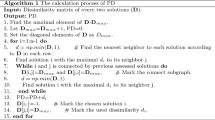Abstract
In this paper, hybrid genetic-SPSA algorithm based on random fuzzy simulation is proposed for solving chance-constrained programming in random fuzzy decision-making systems by combining random fuzzy simulation, genetic algorithm (GA), and simultaneous perturbation stochastic approximation (SPSA). In the provided algorithm, random fuzzy simulation is designed to estimate the chance of a random fuzzy event and the optimistic value to a random fuzzy variable, GA is employed to search for the optimal solution in the entire space, and SPSA is used to improve the new chromosomes obtained by crossover and mutation operations at each generation in GA. At the end of this paper, an example is given to illustrate the effectiveness of the presented algorithm.
Preview
Unable to display preview. Download preview PDF.
Similar content being viewed by others
References
Ishibuchi, H., Murata, T.: A multi-objective genetic local search algorithm and its application to flowshop scheduling. IEEE Transactions on Systems, Man, and Cybernetics - C 28, 392–403 (1998)
Kwakernaak, H.: Fuzzy random variables-I: Definition and theorems. Information Sciences 15, 1–29 (1978)
Liu, B.: Theory and Practice of Uncertain Programming. Physica, Heidelberg (2002)
Liu, Y.K., Liu, B.: Random fuzzy programming with chance measures defined by fuzzy integrals. Mathematical and Computer Modelling 36, 509–524 (2002)
Renders, J.M., Flasse, S.: Hybrid methods using genetic algorithm for global optimization. IEEE Transactions on Systems, Man, and Cybernetics - B 26, 243–258 (1996)
Spall, J.C.: Multivariate stochastic approximation using a simultaneous perturbation gradient approximation. IEEE Transactions on Automatic Control 37, 332–341 (1992)
Spall, J.C.: Implementation of the simultaneous perturbation algorithm for stochastic optimization. IEEE Transactions on Aerospace and Electronic Systems 34, 817–823 (1998)
Tsai, J.T., Liu, T.K., Chou, J.H.: Hybrid Taguchi-genetic algorithm for global numerical optimization. IEEE Transactions on Evolutionary Computation 8, 365–377 (2004)
Author information
Authors and Affiliations
Editor information
Editors and Affiliations
Rights and permissions
Copyright information
© 2005 Springer-Verlag Berlin Heidelberg
About this paper
Cite this paper
Ning, Y., Tang, W., Wang, H. (2005). Hybrid Genetic-SPSA Algorithm Based on Random Fuzzy Simulation for Chance-Constrained Programming. In: Wang, L., Jin, Y. (eds) Fuzzy Systems and Knowledge Discovery. FSKD 2005. Lecture Notes in Computer Science(), vol 3613. Springer, Berlin, Heidelberg. https://doi.org/10.1007/11539506_41
Download citation
DOI: https://doi.org/10.1007/11539506_41
Publisher Name: Springer, Berlin, Heidelberg
Print ISBN: 978-3-540-28312-6
Online ISBN: 978-3-540-31830-9
eBook Packages: Computer ScienceComputer Science (R0)




